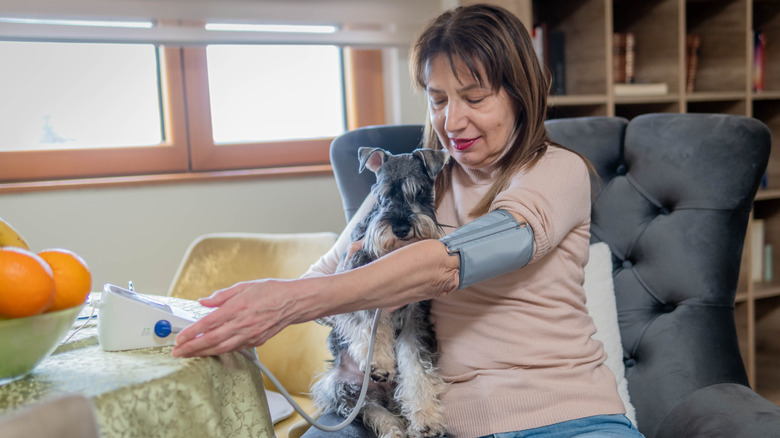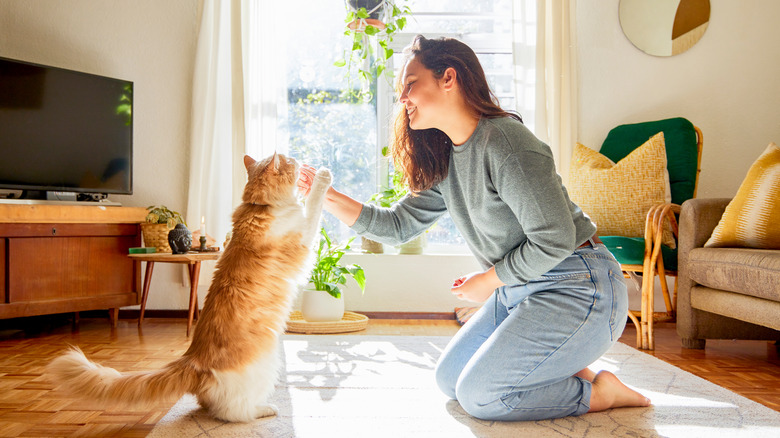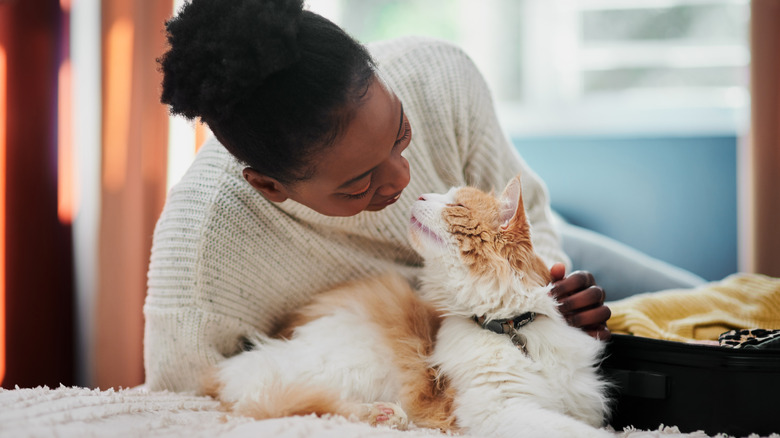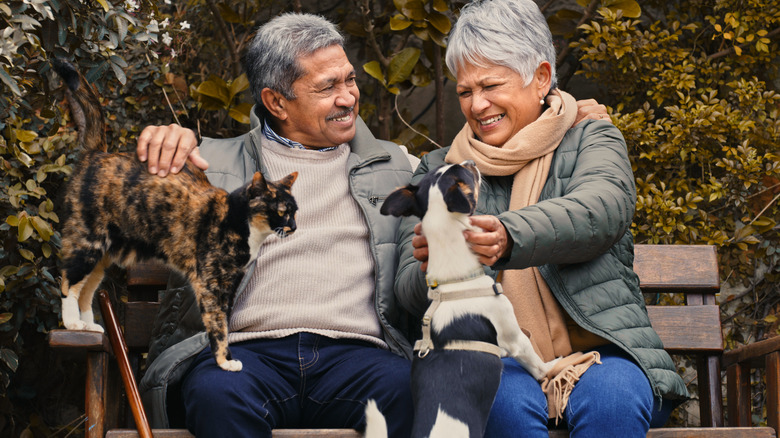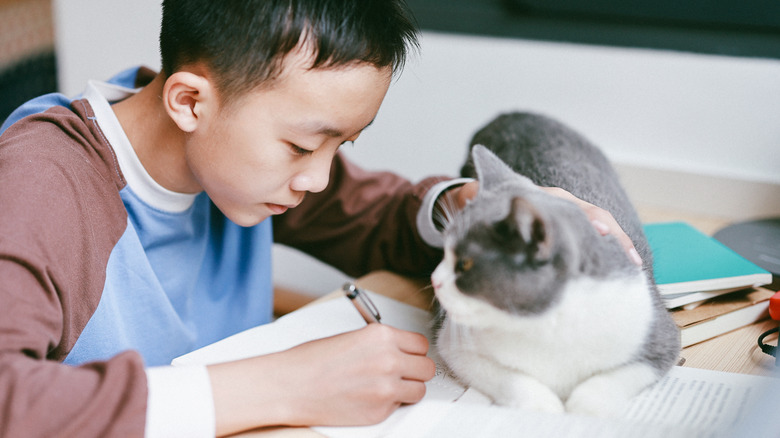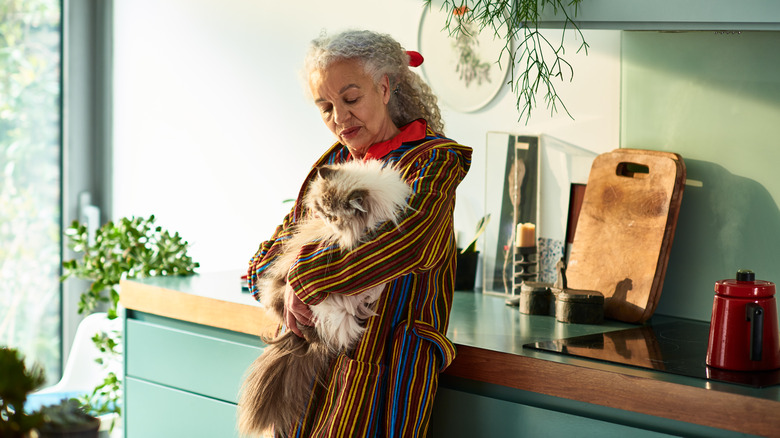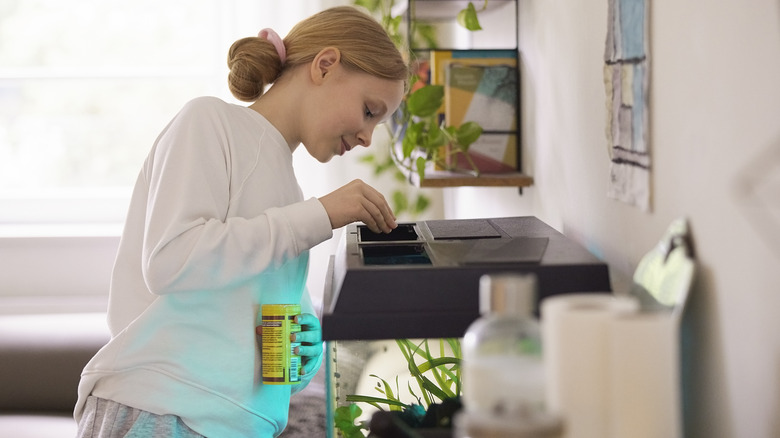The Emotional Benefits Of Owning A Pet: How Our Furry Friends Improve Our Mental Health
Who loves you? Your furry, scaled, feathered, or finned friend does, and that font of unconditional love is just one of the many reasons people keep pets. There's strong anecdotal evidence that suggests pets are particularly helpful for our mental health: The fact that emotional support peacocks had even a fleeting chance at being a believable thing shows that we're all operating from a similar, basic understanding that animals really do help us cope with life. But the evidence of how pets improve our mental health is becoming ever more clear as the studies and surveys continue to roll in.
Just because those mental health benefits might not be immediately visible or tangible, that doesn't make them any less valuable in your life. A few of the "invisible," yet very real, benefits of having pets include less stress and anxiety, a renewed sense of purpose, opportunities to socialize, adding a sense of structure to your routine, and simply knowing that at the end of the day, you're not alone. Some of the mental and emotional benefits of owning a pet translate to physical benefits too.
Stress and anxiety reduction
There are so many things happening in the world today that can pull us right out of the moment and into stress — but because our furry friends are so naturally present themselves, they have a way of drawing us right back into the current moment. There's even a specific designation — DSRD, or disaster stress relief dog — for canines sent into crisis situations to help victims and first responders alike. Such pups can also be deployed in other situations. For example, stress-relief canines circulate in the hallways of some universities during finals week, sent there specifically to help students deal with the stress of those high-stakes exams.
While any type of disaster-response dog requires a lot of training, as do their handlers, your at-home pup, cat, or other pets may offer similar benefits just by being themselves. In a 2023 survey conducted by the American Psychiatric Association, reduced stress and anxiety were among the top benefits reported by pet owners. Many of the responders also said that their animal companions provide a calming influence for them. Dog and cat owners weighed in for the survey, as well as another category simply defined as "other." Your iguana, goldfish, or parakeet probably doesn't qualify for official status as an emotional support animal — but it could still offer some of the same perks.
The reduction in emotional stress provided by pets might have additional benefits. For instance, stress can cause short-term spikes in blood pressure, and the presence of a pet has been shown to correlate with blood pressure reduction. Is that a direct pet-to-stress-to-blood-pressure link? Or is there another mechanism at work? It's hard to say, but logically, the idea of a beloved animal soothing your anxiety and stress along with your elevated blood pressure does make sense.
Companionship
Going back to that American Psychiatric Association survey, another key benefit reported by pet owners was the sense of companionship their furry friends provided. There's nothing quite like having someone to talk to (even if our pets can't quite talk back). Depending on what type of animal you have, they can be a fine partner to do things with, too — whether that's watching TV, going for a run, or building mutual skills with activities like training or learning tricks together.
For a dog, those mutual activities could mean anything from taking walks to basic obedience, flyball, scentwork, or even canine parkour. With cats, the link-up may be a little less obvious, but some do enjoy learning basic tricks like sit and high-five, and a few even like going for walks in a backpack or stroller or on a leash.
With the right tools and persistence on your part, some species of fish can be trained to do simple tricks. Parrots are famous for their intelligence, including the ability to speak or perform on command, and you can even teach a dove to act in response to specific cues. At the end of the day, your imagination is the limit when it comes to making the most of the companionship offered by your furry friend — and studies have shown that the bond established by these shared activities can be as beneficial for your pet as it is for you.
True friendship and unconditional love
Animals are great listeners who never criticize — except maybe a few of the judgier cats. Most of their needs are relatively simple and, when those needs are adequately met, your pet provides a never-ending font of unconditional love in return. That sense of unconditional love and support was among the top benefits mentioned by pet owners in the aforementioned survey from the American Psychiatric Association, and it's anecdotally acknowledged by the many pet owners who have described their furry loved one as a best friend.
Depending on your pet type and their personality, they can also demonstrate incredible loyalty — like the most protective dog breeds or a cat who won't leave your side when you're feeling ill — and unmatched enthusiasm at welcoming you home or the prospect of doing something with you. And they aren't going to judge you for not having done the dishes in a day — or a week.
Even some types of fish learn to recognize their owners, telling them apart from other humans. The bottom line is that most pets are happy to see you simply because you exist in their lives. The bond created by that sort of unconditional love and acceptance can truly uplift and support you in the face of other challenges, even things as dire as addiction.
Increased physical activity
This one is especially true for dog owners, as your pup needs physical activity to be healthy and happy — and they will hound you for it incessantly. Given this, it's no surprise that the benefits for dog owners of walking, running, or even just going outside to play fetch have been well-documented. The bump in physical activity associated with dog ownership can improve blood pressure, reduce your risk of cardiovascular disease, boost your mood, and help you better manage blood sugar.
Smaller pets can encourage physical activity too, with all the potential physical and mental benefits of getting you moving. All the labor that goes into caring for and interacting with an animal companion of any kind, from feeding them to grooming and playing with them, contributes to your total physical activity during the day. Whether you're the sort who enjoys teaching a high-energy, high-intensity Malinois or is more into throwing crinkled paper balls for your cats to chase, the right type of pet for you is out there — which is part of why it's so important to choose a pet whose activity needs match yours.
A sense of structure and self-confidence
Having a pet gives you a reason to get out of bed every day, even if you don't always feel like doing so for yourself — which is both a blessing and an important commitment. Your furry friend counts on you for the essentials of its survival, and its presence creates an innate sense of structure and routine that can feel satisfying and grounding, even if nothing else in your day seems to be going right.
Consider, for example, a 2019 study published in the journal Aging & Mental Health on the mental health benefits of pet ownership for older adults. Although the study cohort was small, the researchers noted that having a pet instilled a sense of purpose and meaning in their owner's life. Having pets around may even have increased the adults' resilience against the mental health issues that sometimes crop up with age.
Cues to build social ties
Dogs are particularly good at helping us build social ties, as they need us to get them out of the house for walks and potty time, at a minimum. The simple act of being outside with your canine is an incredible icebreaker. Add in the magic of shared interests — perhaps you're in a scentwork or agility club, or hanging out in a dog park where it's reasonable to expect most people present will have canines — and it gets pretty easy to start a conversation.
"Dogs don't only act as important social lubricant and support, they also change the way we interact with other people," Phil Tedeschi, a human-pet relationship expert and Executive Director of the Institute for Human-Animal Connection at the University of Denver within the Graduate School of Social Work, explained to the AKC. "Research suggests that our connections with dogs increase our social interactions, evidenced by more openness to others, initiating conversations, focusing toward other people, being more positive, increased physical activity and play, and more laughing."
While dogs may be the kings and queens of getting their humans socialized, owners of other pet types aren't out in the cold entirely. While there is no such thing as an iguana or gerbil park you can take those pets to, there are enthusiast clubs out there, both online and in person, for almost every type of pet under the sun. If you have a purebred animal, competitions — like cat shows or dog shows — might be another way of socializing. With more cat shows offering a "household pet" category, having a"competitive frenemy" isn't necessarily exclusive to owners of purebred animals nowadays.
Increased focus
It may be tempting to think that pets will be a distraction in your life — and of course, anyone who's ever tried to run a Zoom call with a pet in the room can confirm this is sometimes true. But a growing body of clinical trials shows that interacting with pets actually generates a net positive effect on ability to focus. For example, a 2024 study in Korea found that grooming and playing with a dog strengthened beta-band activity in adult participants' brains, which is associated with an improved ability to focus and concentrate.
Children's ability to focus can benefit from exposure to animals, too. Research analysis from 2017 from around the world found that when animals were present in the classroom, children were better at staying focused and following instructions. In fact, they actually paid more attention to the teacher when a dog was in the room — not less. In another study, children with ADHD showed better outcomes in terms of focus when they read books out loud to a real dog, as opposed to a control group that read to a dog puppet.
Sensitivity to social cues
Interacting with pets can be a fine way for children to improve their social skills. While this isn't exclusive to children with autism, that is the population most studied in this respect. As long as you choose a pet they can bond with, such as one of the best dog breeds for children with autism, these kids benefit greatly from the opportunity to develop their empathy and communication skills. In particular, a 2015 study that followed children with autism who played with guinea pigs in the classroom showed that they were calmer and more able to engage with their peers on a social level after just 10 minutes.
A growing body of evidence suggests that dogs can help children of all ages, with or without autism, learn how to decipher social cues. The explanations for this phenomenon vary from expert to expert, with some citing the way animals help children develop empathy. "For many children, pets are a source of unconditional love and loyalty. They can be social enablers and help teach children about responsibility through caring, training and looking after their pet," Associate Professor Christian, Senior research fellow with the Telethon Kids Institute and The University of Western Australia, shared with the American Kennel Club. Others theorize that unconditional love from the dog boosts the child's self-esteem and confidence. Either way, kids who have spent time with dogs had fewer behavioral problems and showed better development and well-being overall.
These benefits aren't only related to canines, nor to children. A study published in PLOS One showed that other pet types, including rabbits, snakes, and cats, seemed to help their adult keepers make friends and find sources of social support.
Loneliness reduction
More and more officials, including the Surgeon General of the United States, Dr. Vivek Murthy, are treating the phenomenon of loneliness as a public health crisis. As abstract as the concept of loneliness may seem, it has very real impacts on our physical and mental health, among them an increased risk of early death.
Enter the pet: The majority of owners who responded to a poll by the American Psychiatric Association shared that having animal companions helped them feel less alone. Pets also increase quality of life for people with long-term diseases like dementia, and having a strong connection with your furry friend has been shown to reduce depression in older adults — arguably the population most at risk for loneliness and social isolation.
Unless you have a parrot living with you, your pets can't talk back to you directly. But their simple presence, unconditional love, and eagerness to engage can all be a balm to the stings of loneliness.
Support while processing trauma
If you've been through trauma in life, your body has a way of recording the sensation and experiences and then playing them back in an interminable feedback loop. That loop might be a constant background hum, or maybe it surfaces with a vengeance at the slightest trigger — or both. The good news is that there are interventions that can "turn down the volume" on the symptoms of this lingering trauma — PTSD or post-traumatic stress disorder — and some of them involve animals.
Dogs represent the most widely studied animal intervention for PTSD, with a solid body of research showing that both pet canines and service dogs excel at reading human emotions and comforting us. Equine therapy has also been demonstrated to be a highly effective intervention, although the cost and time investment of owning a horse mean most people are more likely to visit one than to have it as a pet.
There's little to no clinical research about cats helping humans overcome their trauma, but plenty of anecdotes from cat owners who say their small, furry friends have helped them persevere and cope with trauma. Even if your type of pet isn't mentioned here, the bond you form with them can still be helpful. In fact, farm animals, such as sheep and pigs, have been shown to be worthy allies in terms of trauma recovery.
Health condition management
It may be tempting to write mental health off as "out of sight, out of mind," given that it's all but invisible to anyone who isn't directly experiencing it. But anyone who's lived through mental health challenges, mild or otherwise, can attest to the very real effects these "invisible" conditions have on our lives, and the tangible ways in which our mental health also affects our physical health. The link between stress and spikes in high blood pressure is fairly well documented, but scientists are still discovering other ways in which the emotional benefits of having a pet at home can extend to your physical body, too.
In a study partially funded by the National Institutes of Health, adolescents with type 1 diabetes were asked to pair their pet-related activities every day — in this case, taking care of fish in an aquarium — with reviewing their glucose logs with their parents. Other adolescents in the study still reviewed the glucose logs, but only received a picture of a fish instead of real fish. By the end of the study, it became clear that the young people who'd received real fish, and thus had a care routine related to them, had much greater success in controlling their blood sugar levels.
Another study published in Circulation: Cardiovascular Quality and Outcomes found that dog owners who had a stroke or heart attack were more likely to survive than those who didn't have a pup waiting for them at home. Cat ownership has been shown to have a similarly protective effect, and an analysis of the limited research available on general benefits of fish ownership published in PLOS One shows that there is the potential for a positive correlation on several fronts beyond the aforementioned study of type 1 diabetes outcomes. You might even say that science is only just catching up to what pet parents have known for a long time: Pets really do make our lives better.

